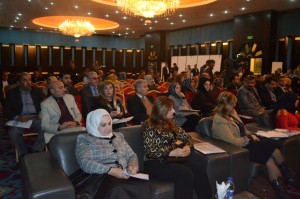PEACE established a National Task Force in Iraq on the Elimination of Gender Based Violence (GBV) and provided a national platform for leading women and men and community-based organizations advancing successful efforts to eliminate violence against women and other forms of gender-based violence.
Peaceful Empowerment, Advocacy, and Cooperation to End Violence (PEACE)
The Iraq Foundation was awarded a grant from the US Department of State Secretary’s Office of Global Women’s Issues to establish a National Task Force in Iraq for the elimination of Gender Based Violence (GBV), providing a national platform for women and men leading community-based organizations to combat GBV. The objectives of PEACE were building coalitions for women’s participation at the local and national level, protection of women affected by violence, and advocacy for women’s participation and gender responsive policies. PEACE operated in five provinces: Baghdad, Babylon, Erbil, Diyala and Basra.
Protection of women affected by violence
IF conducted interviews with 102 victimized women, storing information about their cases in a newly developed database and drafting a case studies report. The report was distributed to partner NGOs, stakeholders and attendees of the conferences described below. 25 lawyers in five provinces were trained on working with women victims of violence, then provided legal assistance to women through established legal clinics in the provinces.1583 women were reached by the counseling services and 553 assisted in following-up on their cases in court.
Building coalitions for women’s participation from the local to the national level
Caucuses consisting of local women leaders were formed in all five provinces.The meetings discussed the social conditions, difficulties, unfulfilled needs, and other factors affecting victimized women. Then women were provided the opportunity to speak with provincial and national leaders. This allowed the women who formed the mixed-gender local coalitions to acquire the knowledge, experience, and confidence to promote themselves as peacemakers and continue to act locally and nationally. PEACE conducted 53 advocacy meetings to raise awareness of the National Charter’s recommendations (described below) and conducted hearing sessions for victimized women to reach out to government officials to tell their stories. The first tangible result of these sessions was the formation of a committee in the Al-Sadr City Council to deal with the needs of victimized women and provide assistance and referrals when necessary.
A first National Conference was held in September of 2013. The Conference resulted in the drafting of a National Charter with 10 recommendations to improve the living conditions of GBV victims and take practical steps towards ending violence against women. The National Charter obtained 13 statement of support from high ranking government officials It was published through a number of news venues, including:
- Civil Society Activists’ Blog
- Kitaabat
- WEO News Agency of the Kurdistan Region
- Voice of Kurdistan
- TV Interviews with the Erbil National Task Force
The conference also formed a National Task Force comprised of 408 members in five provinces. This task force voluntarily led efforts to hold hearing sessions and advocacy meetings, to publish and disseminate the National Charter through local media and social media, and to raise awareness among local and national government decision-makers about the recommendations of the National Charter. The recommendations have been presented and discussed in conferences, seminars, radio programs, and TV programs all over the country to attract more stakeholders to join Iraq Foundation’s efforts to towards ending violence against women in Iraq.
IF conducted the Second National Conference in December 2014. It was attended by 136 people representing the Iraqi government, NGOs, and media groups. The participants reviewed PEACE’s accomplishments, how to utilize the PEACE project’s momentum, the PEACE project data base, and the project’s progress in legal, social, and economic reforms based on the indicators established by the National Charter and the progress made by national and local government agencies. It was covered by Jousour and the Iraqi Media for Social Media.
Media Campaigns
1. Two 15 minute radio programs were led by Basrah task force members. They discussed PEACE; the legal clinics, UNSCR 1325, and the National Charter. The programs were broadcast by Al-Basrah radio during Hawa program, which focuses on women issues.
2. Diyala local radio hosted two task force teams to present and discuss the recommendation of the national charter.
3. Erbil task force members presented the national coalition efforts towards ending violence against women in ASIA T.V.
4. Another female taskforce member participated in a famous program presented by Al-Baghdaia T.V. to talk about GBV in Iraq and the efforts of the national coalition to end the violence against women in Iraq.
5. IF reached out to TV stations to broadcast PEACE TV spots for the campaign. The first and second TV spots were broadcast on the channels of Al-Furat and Al-Rasheed.
6. IF broadcast the final version of the Radio Spot 20 times on local radio stations in the four provinces of Baghdad, Erbil, Basrah and Babil, and 40 times in Diyala.
7. IF Printed 5000 posters and 6000 brochures in Arabic and Kurdish to present the national charter and the importance of women’s empowerment.
8. IF launched a Facebook page for PEACE





